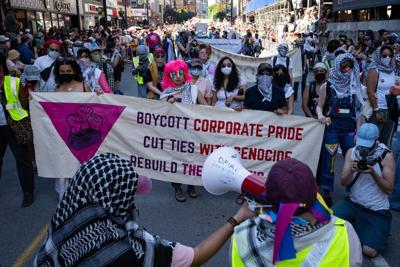TORONTO - As a major funding shortfall looms over Pride ╔ź╔ź└▓, some prominent LGBTQ+ advocates say it’s high time to rethink the organization’s corporate partnerships and return to its political grassroots.┬á
Ahead of last month’s Pride parade, organizers sounded the alarm over Pride ╔ź╔ź└▓’s $900,000 shortfall after sponsors such as Google, Nissan, ╔ź╔ź└▓ Depot and Clorox pulled their support.┬á
Pride ╔ź╔ź└▓ executive director Kojo Modeste attributed the corporate withdrawals to backlash against diversity, equity and inclusion efforts in the United States, though some of the companies said their decisions were made solely because of budgetary considerations.┬á
Although this year’s festivities went ahead as planned, Modeste warned that next year’s Pride festival may have to be scaled back.
Fatima Amarshi, a former executive director of Pride ╔ź╔ź└▓, says this is the right moment for a reset.┬á
Amarshi led the organization for three years starting in 2005, right after Canada legalized same-sex marriage, and helped lay the foundation of its current funding model.  
At that time, she said Pride ╔ź╔ź└▓ vetted corporate sponsors only to ensure their internal policies were supportive of LGBTQ+ employees and the broader community.
ÔÇťWe werenÔÇÖt looking at how corporate sponsors were funding arms manufacturers or fossil fuels or efforts to suppress Indigenous land claims. We were linking queer rights to human rights at the level of state repression and legislative oppression, but not via those who fund those efforts,ÔÇŁ she said.┬á
During her tenure, Pride ╔ź╔ź└▓ÔÇÖs budget grew from a little under $1 million to around $3 million, Amarshi said.┬á
But as that budget expanded over the years thanks to major corporate sponsors, some criticized the increasing commercialization of the annual Pride festival at the expense of its original purpose. More recently, Pride ╔ź╔ź└▓ has faced calls to cut ties with corporations that allegedly profit from Israel’s offensive in Gaza.
Gary Kinsman, one of the founding members of the Lesbian and Gay Day Pride Parade ÔÇô the organization that eventually became Pride ╔ź╔ź└▓ ÔÇô resigned in 2024 over that issue and what he called the organization’s refusal to hear the demands of the group Queers in Palestine.┬á
Founded in 1981, the Lesbian and Gay Day Pride Parade was a grassroots picnic and political march formed in response to increasing right-wing opposition to the LGBTQ+ community and a series of violent raids by ╔ź╔ź└▓ police at bathhouses in the city. The first event involved a march down a much shorter strip of Yonge Street in front of the police detachment that organized the raids.
Kinsman said the grassroots spirit of the festival continued throughout the 1980s, but a turning point came in the ‘90s when organizers started looking to involve corporate sponsors, which prompted early signs of division that came decades later.┬á
“This begins to change its (Pride) character fundamentally. It moves quite sharply from being a community-based organization to becoming an organization not defined by communities but by alliances with corporate forms of organization,” Kinsman said in an interview.
Pride ╔ź╔ź└▓ did not respond to requests for comment for this story.┬á
For Beverly Bain, who along with Kinsman co-founded a group called No Pride in Policing, the growing calls to break Pride ╔ź╔ź└▓’s ties with corporate sponsors is long overdue.┬á
ÔÇťPride ╔ź╔ź└▓, as it exists today, is a corporate pinkwashing Pride. I do not think itÔÇÖs an organization that should be continuing to exist,” Bain said.
Pride ╔ź╔ź└▓ hasn’t adequately highlighted issues that disproportionately affect the LGBTQ+ community, such as poor access to housing, mental health struggles and increased substance use, Bain said.
ÔÇťWe go back to the political roots of Pride ÔÇŽ a political struggle for the liberation of queer and trans and non-binary and those who are racialized and those who are Indigenous and two-spirited and Indigenous and queer.ÔÇŁ
Monica Forrester, executive director of Trans Pride ╔ź╔ź└▓, said she started attending the Pride festival in 1998, when it was still very much a protest organized by local shops, bars and community centres.
“We were still in a time of the bath house raids ... and the transphobia and violence that a lot of queer people were facing, not only by people, but by systemic violence. It was really a time where we stood up to show our visibility, that we were here, we were queer and we weren’t going anywhere,” Forrester said.
But that changed over time, with corporate sponsors appearing to be at the forefront of Pride events, Forrester said. The fact that some of them have pulled support for the festival is “a testament that they were never really our allies,” she added.┬á
Faisal Ibrahim, a spokesperson for the Coalition Against Pinkwashing, said it would be a “bare minimum” for Pride ╔ź╔ź└▓ to cut ties with sponsors who financially benefit from Israel’s war efforts in Gaza, and agrees with Forrester that a heavy corporate presence can detract from the overall message of Pride.
Looking back, Amarshi said it was ÔÇťincredibly short-sightedÔÇŁ to bring corporate sponsors into what she said has been a vital institution in advocating for queer rights.┬á
ÔÇťIf Pride doesnÔÇÖt find a way to manoeuvre and be accountable to the community and continue to be in a position where the community feels it legitimately represents them, the community will find its own voice and will find its own path forward.” Amarshi said.┬á
“ItÔÇÖs never needed scale. ItÔÇÖs needed to be loud and itÔÇÖs needed to be brave. ThatÔÇÖs what started Pride and that certainly hasnÔÇÖt gone away.”



























To join the conversation set a first and last name in your user profile.
Sign in or register for free to join the Conversation